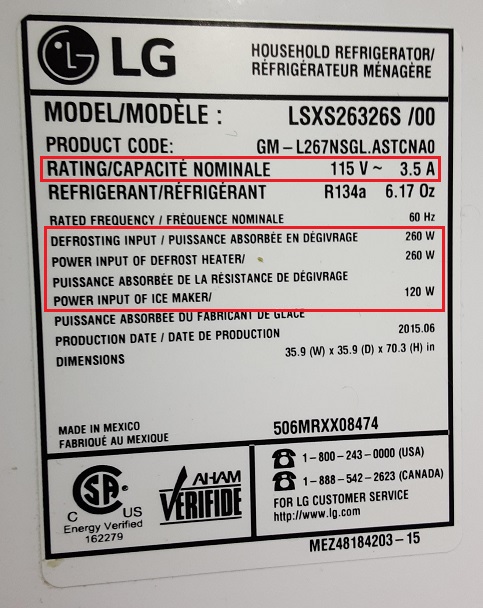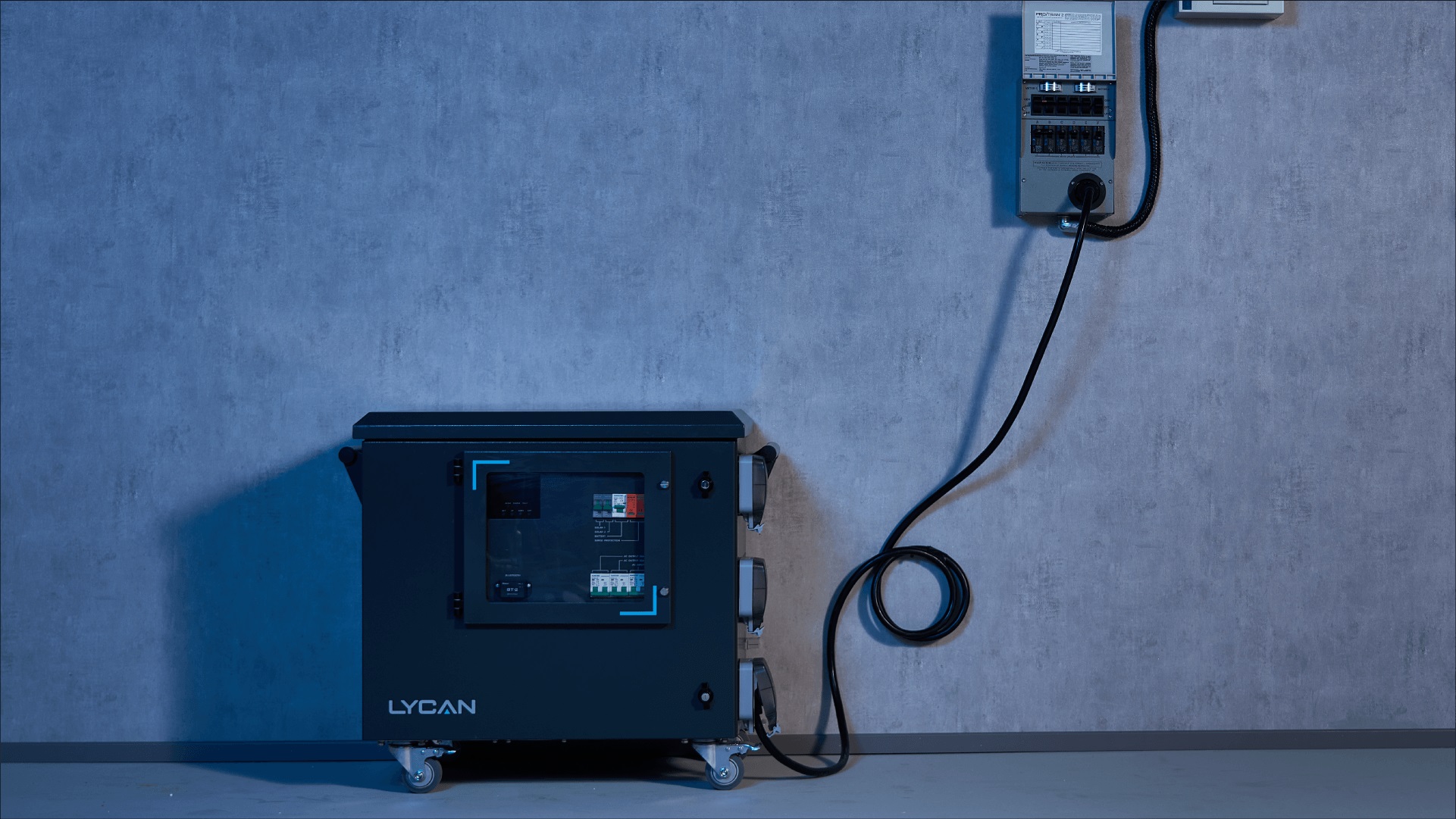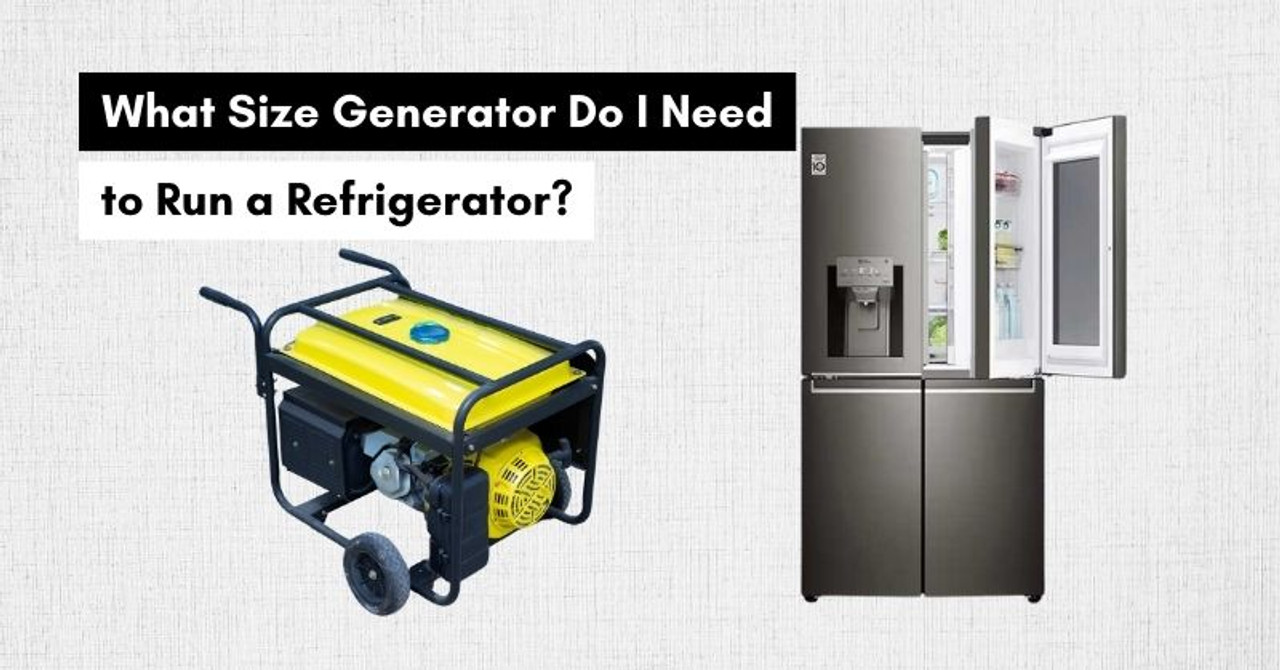What Size Generator Do I Need to Run a Refrigerator?
Power outages can occur for several reasons, including overload, bad weather conditions, human error, or natural causes. When a power outage occurs, the electricity supply from the main grid gets cut off. As a result, the power supply from all your essentials, like refrigerators and water pumps, gets disconnected.
If you are experiencing this situation, you will need a reliable backup power source to run the refrigerator. When it comes to choosing the generator for your refrigerator, don't forget to ensure that it meets at least the minimum power required for the refrigerator. Doing this will ensure that your refrigerator runs safely and efficiently.
This article explains everything, from the power rating of a refrigerator to choosing the right generator for safe operation and much more.
Why do you need a generator for your refrigerator?
Do you live in extreme weather conditions? Often experience power outages due to bad weather conditions? Do your food items often produce a smell because the refrigerator gets turned off during power outages? This is where you need a dependable backup power source like a generator to power up all the essentials and keep your food fresh.
Simply put, the best way to deal with power outages during extreme weather conditions is to have a standby generator installed in your home. You get peace of mind when you know that you have a reliable backup power source that will energize the essentials during power outages. In addition, a generator ensures a consistent power supply when the electricity goes out.
Apart from just running a refrigerator, a home generator offers a range of benefits. When an electric supply from the grid is cut off suddenly, it may damage the heating or cooling system that is running at the time. But a generator keeps you away from facing this scenario, as it provides instant power and reduces your expenses on repairing the damaged appliances or replacing them with new ones.
How many watts does a refrigerator use?
Well, the power consumption may vary from one refrigerator to another. It actually depends on various factors, such as the size, make, and model. However, the average power that a refrigerator uses lies between 300W and 800W. Today's market offers a wide range of refrigerators. Some of them are more efficient than others. The advancements in this domain have made the latest models more efficient than the previous ones.
Wattage overview
If we talk about a compact or mini fridge, the average running wattage can be anywhere between 70W and 90W. The old makes and models may run at 100W. The starting wattage is always higher than the running wattage, which is why most compact fridges run from 280W to 360W. On average, the starting wattage of a mini refrigerator is usually three times higher than its running wattage.
Bigger refrigerators use more power than their mini alternatives because they offer more space to store food items and need more power to keep them all fresh. Therefore, a full-size refrigerator consumes power between 350W and 800W. It runs at 120V and between 3 amps and 6 amps.
Starting vs. running watts
The starting watts are the power your fridge consumes when you first turn it on. It is also called surge power. The starting power is always higher than the running wattage and is consumed for a limited duration (in the beginning only). When the fridge starts to run smoothly, it reduces its power consumption.
In comparison, the running wattage refers to the power required by the refrigerator once it is up and running smoothly. The running wattage provides power to the internal circuitry and the compressor for seamless operation.
How to check your refrigerator's wattage?
The best way to check the power consumption of your fridge is to look at the rating plate or a nameplate. There, you can see the model, wattage, amps, and volts. This plate is usually attached to the back side of the refrigerator, as shown below.

Another method for determining the power consumption of your refrigerator is to read through the manufacturer's instructions provided with the appliance. This is an accurate way to know the power rating of your refrigerator or freezer.
Whether you are searching for the compact refrigerator's power rating on a nameplate or in the manufacturer's manual, you will find it between 100W and 200W. Whereas, the power is between 400W and 800W for standard fridges.
What size generator do I need to run a refrigerator?
The size of a generator required to power up your fridge largely depends on the model, size, and features of the refrigerator.
If you want to run a compact fridge, a 1000W generator will be enough to provide the required power. Similarly, a 2000W and a 5000W generator will be required to run a standard and a full-size refrigerator. Let's now look at the steps required to determine the size of the generator for your fridge.
Step 1: Check the rating plate or the manufacturer's manual to find the voltage your refrigerator uses. The rating plate is mostly attached to the back side or the bottom of the fridge. The voltage rating must be 120 volts or 240 volts.
Step 2: Now, determine the amps required to run your refrigerator. To do this, you can check the manufacturer's specifications or the nameplate, as we did in the previous step. The average current rating of refrigerators lies between 3 amps and 6 amps.
Step 3: You can now multiply the voltage rating with the current or amps rating to determine the power required to run your refrigerator.
Let's do an example calculation to understand this concept better. Suppose your refrigerator runs at 120 volts and consumes 6A for starting and 4A for running.
Starting wattage = 120 x 6 = 720W
Running wattage = 120 x 4 = 480W
Now that you have the actual refrigerator's power requirements. We have to add 20% extra power to determine the generator size. The extra addition is incorporated to cover up the power losses.
Starting wattage = 720 + (720 x 0.2) = 864W
Running wattage = 480+ (480 x 0.2) = 576W
The calculation shows that a 1000W generator can power up the refrigerator we considered in the example.
Choosing the right generator for your refrigerator
Before heading toward selecting the right generator for your refrigerator, let's first get familiar with different types of generators and their applications. Generally, generators are categorized into three types, as listed and explained below.
- Portable generators: They are perfect for outdoor applications, such as camping and other similar events. In addition, portable generators are suitable for short-term outages and small appliances. They are cost-effective and easy to carry.
- Inverter generators: They run longer with the same amount of fuel and are best for energy-efficient applications and quieter operation. Moreover, they are considered ideal for battery-operated devices and recreational vehicles.
- Whole-house generators: They are useful in providing the required power in case of power failure from the main grid or outages. You can use these generators to power up all the appliances, including your refrigerator or freezer.
Inverter vs. conventional generator: Which type is best for a refrigerator?
An inverter generator is an ideal choice when you do not need a high amount of power but require reliable and cleaner power. Therefore, they are ideal for outdoor applications, as stated earlier.
Though a conventional generator is noisy and bulky, it has the ability to produce a huge amount of power (up to 7,000W to 10,000W). You can use this generator to power up everything in your house.
Therefore, if you are a camping enthusiast and are looking for a suitable generator for your RV, go for an inverter generator. On the other hand, if you need a generator for your home or office, a conventional portable generator will be a suitable option.
Best solar generators for refrigerator
Do you want to buy a dependable generator for your refrigerator? Look no further than Renogy LYCAN 5000 Power Box - an all-in-one energy storage system. It is explicitly designed for off-grid homes, power outages, and emergencies.

LYCAN 5000 supports fast charging, an output of up to 3500W, and a seamless expansion of up to 19.2kWh. Interestingly, this powerful generator maximizes solar energy generation in the daytime with its intelligent Maximum Power Point Tracking (MPPT) algorithm.
Moreover, it can obtain a full charge within 2.5 hours. If you connect the LYCAN to both AC outlets and PV panels, the charging time will be reduced further (1 hour from 0-80%).
Conclusion
Are you wondering what generator to choose for your refrigerator? Don't you know how to make the right selection? First, determine your refrigerator's starting and running wattage. To calculate both wattages, look for the rated currents and voltage on a nameplate or in the manufacturer's specifications. Then, multiply the rated voltage and current to calculate the power.
Once you have the power your refrigerator needs, add 20% extra to it to incorporate power losses while selecting the best generator. You can find different generator types in today's market: portable, inverter, and whole-house (good for outdoor applications, energy-efficient applications, and powering up the whole house, respectively).
Frequently asked questions
Can I plug a refrigerator directly into a generator?
Yes, you can directly plug a refrigerator directly into a battery-powered generator. The same is the case with inverter generators. On the other hand, bigger generators do not have direct ports to plug in appliances directly.
How long can a refrigerator run on a generator?
On average, a generator can power up a refrigerator for about 4 to 15 hours. If a generator energizes a fridge for 4 hours, it will maintain the temperature for about 6 hours.
How do I know if my generator is big enough for my refrigerator?
If a generator can provide 20% or a little more power than the exact amount of power required to run your refrigerator. If you have installed a 1000W generator, it can run a mini or compact refrigerator. Similarly, you can run a standard and a full-size fridge with a 2,000W and a 5,000W generator, respectively.










